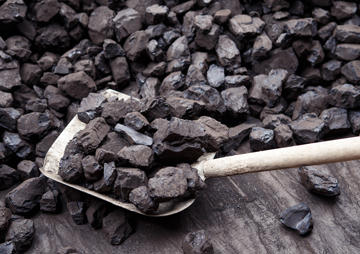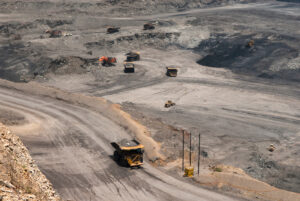Trouble in Coal Country: Health Care at Risk for 12,000 Retired Miners and Their Families
Peabody Energy, the nation’s largest coal company, is seeking release from a pledge to pay into a health insurance fund. Shutterstock
Shutterstock
By Alec MacGillis / ProPublicaThis piece originally ran on ProPublica.
John R. Leach worked for Peabody Energy Corp. in western Kentucky for 23 years. When he retired, he and his wife Rhonda relied on his pension and health benefits not only for themselves but to care for two severely disabled adult children. So when Peabody notified them in 2007 that their benefits were now the responsibility of a spinoff called Patriot Coal, they had a worrisome premonition.
“We said, ‘There’s something going on here that’s not right,'” Rhonda Leach said.
The family’s worries were justified. When Patriot filed for bankruptcy two years ago, retiree benefits for thousands of mining families were put at risk. While Peabody eventually agreed to pay for some of those costs, Patriot is now back in financial trouble. This time around, Peabody is quietly seeking to get out of paying for any of its remaining agreed-upon obligations to its retirees.
“All I could think is, you dirty, low-down rotten scoundrels. How could anyone with a conscience do something like this?” Rhonda Leach said.
Peabody’s maneuver is perhaps the starkest example yet of how corporate engineering by coal companies under increasing economic duress is imperiling whatever security workers and retirees still possess after their years of work in frequently dangerous conditions.
It dwarfs another attempt to undermine retired miners’ health benefits as part of the Patriot bankruptcy, which ProPublica wrote about earlier this month. In that instance, lawyers for Patriot were seeking to redirect for themselves and others involved in the bankruptcy case $18 million that was intended for the health benefits for about 200 retired miners in southern Indiana.
After ProPublica reported on that proposal and both Hillary and Bill Clinton spoke out against it, the lawyers withdrew that plan from the Richmond, Va., court handling Patriot’s bankruptcy.
What Peabody is now proposing represents a sum eight times as big — $145 million — and a pool of retirees far larger than the southern Indiana group. If Peabody prevails, it will mean that a fund that covers 12,000 retired miners, their dependents and widows — most of them in Kentucky and West Virginia — will run dry early next year, much sooner than expected. This will raise pressure in Congress to bail out the fund with taxpayer money.
Hillary Clinton, who is seeking the Democratic presidential nomination, issued a statement yesterday about Peabody’s latest plan. “These are people who put their own health and safety at risk for years so the rest of us could have the affordable, reliable electricity we take for granted, and now many suffer from black lung disease and other job-related illnesses,” Clinton said. “They are entitled to the benefits they’ve earned, and which Peabody just two years ago committed to pay. I hope Peabody does the right thing, reverses course, and honors the commitments it’s made.”
The issue has its roots in the restructuring eight years ago by Peabody, the nation’s largest coal company. It created Patriot Coal and transferred to the new firm 13 percent of its coal reserves and 40 percent of its health care liabilities, the obligations for 8,400 former Peabody employees and dependents. Patriot added responsibility for another 2,300 retirees and dependents when it acquired Magnum Coal, a spinoff from the country’s second-largest coal company, Arch.
Under union contracts, the retirees qualified for their health benefits by working in the mines for at least 20 years.
The implications of the Peabody spinoff weren’t entirely clear at the time, since the coal industry was still in relatively strong shape. But by 2012, coal companies were being pressed by competition from cheap natural gas, new environmental regulations and declining Appalachian reserves. Patriot, with its total liabilities rising to $1.37 billion, filed for Chapter 11 bankruptcy, putting the benefits of its nearly 11,000 Peabody and Arch retirees and dependents at risk.
This drew the attention of Temple University business professor Bruce Rader, who wrote an article arguing that Peabody’s maneuver should worry believers in free-market capitalism. “This is a perfect example of the use of the legal system to socialize the costs and therefore lead to a transfer of costs to the general public from the shareholders of a company,” Rader wrote.
But the judge overseeing the case in the bankruptcy court in St. Louis, Kathy Surratt-States, disagreed, and initially granted Patriot’s request to offload more than $1.5 billion in retiree obligations. “Was Debtor Patriot Coal Corporation created to fail? Maybe not. Maybe,” wrote Surratt-States.” Regardless, she continued, the miners’ benefits were probably too generous to begin with: “Unions generally try to bargain for the best deal for their members. However, there is likely some responsibility to be absorbed for demanding benefits that the employer cannot realistically fund in perpetuity, particularly given the availability of sophisticated actuarial analysts and cost trend experts.”
It was only after further legal pressure from the United Mine Workers of America, as well as voluble protests at Peabody’s St. Louis headquarters by union members, that Peabody agreed to a partial compromise. A voluntary employee beneficiary association — VEBA — was established to cover the benefits of the 11,000 retirees and dependents. The VEBA was to be overseen by the union, but it would be funded with $400 million from the coal companies, $310 million of that from Peabody, whose retirees made up more than two-thirds of those in the VEBA.
This was much less than the $1.45 billion that the companies estimated as the benefits’ cost, but it was better than nothing. In exchange, the union gave up an equity stake it had in Patriot, and it had to pledge not to disparage the companies.
Patriot also obtained new financing from a New York hedge fund, Knighthead Capital, which allowed it to emerge from Chapter 11. But the coal industry declined even more sharply, and earlier this year Patriot filed for Chapter 11 yet again, one of a host of companies to do so. This time, it is auctioning off its mines, mostly to another coal venture also backed by Knighthead.
While this bankruptcy has been playing out in Richmond, Peabody made its move in St. Louis, asking the same judge who sided with it two years ago, Surratt-States, to reopen the 2013 agreement that established the VEBA payments. In effect, Peabody argued, it should be allowed out of that agreement with the UMWA and Patriot since Patriot was going out of existence. With more retirees having become eligible for the fund since 2013, it now holds about 12,000 people — 3,500 of them from Arch/Magnum, and the rest from Peabody.
On Oct. 9, Surratt-States granted Peabody’s request to reopen the 2013 agreement and make its case for getting out of its remaining VEBA payments — $75 million due in January and another $70 million a year after that.
Last week, the UMWA filed a challenge, arguing that the fate of the VEBA payments should instead be addressed by the Richmond court handling the Patriot bankruptcy, since if Peabody is allowed out of the $145 million in payments, the union would demand those from Patriot instead. “Peabody remains obligated to fulfill its obligations under the contract to the UMWA, notwithstanding” Patriot’s collapse, the union said. Peabody, it continued, would be “inequitably and unjustly enriched” by being allowed out of the payments. The St. Louis Post-Dispatch first reported on the confrontationlast week.
Asked about Peabody’s effort to undo the 2013 agreement, a company spokeswoman provided a statement saying simply, “We look forward to gaining additional clarity on the three-party 2013 Settlement Agreement. This court [St. Louis] is the proper place to decide this given it originally settled the 2013 agreement.” The spokeswoman also challenged a reference to those in the VEBA as “Peabody retirees.” “Please note that this is a group of Patriot retirees — not Peabody,” she wrote. In fact, the vast majority of them had in fact worked for Peabody and retired from it prior to the creation of Patriot — after all, they needed to work for 20 years to qualify for benefits, and Patriot has existed since only 2007.
The VEBA was expected to run dry in a few years even with Peabody’s remaining $145 million on the books, given that the payments agreed upon in 2013 amounted to less than a third of the benefits’ expected cost. Anticipating this depletion, there has been a move afoot in Congress to put the retirees into the Coal Act fund, which has since 1992 been covering union retirees from shuttered mines.
That fund was for years fed by the interest from fees coal companies were paying to restore abandoned mines, but since 2006 it has been buttressed by $490 million per year in taxpayer money. The proposal to add the VEBA members to the fund has 54 co-sponsors, but is still awaiting a hearing in the House. If Peabody is allowed out of the $145 million obligation, the question of a taxpayer bailout would become far more urgent — the union says the fund could run out as early as January.
The union is gearing up for protests before it comes to that. “We’re going to try to fight as good as we can,” said Kenny Smith, 64, who worked 17 years at Peabody mines in western Kentucky and was the vice president of his union local, and relies on his coverage for his serious heart disease. “We kept our deal and they didn’t keep their deal. Back where I’m from in Harlan County, you tell a man a promise, you keep it.”
The Leaches, who provide their adult children’s home care on their own, depend on the retiree insurance to supplement disability insurance for the extensive costs they incur, everything from replacing feeding tubes to treating staph infections to paying for a special bar that connects their wheelchairs so that Rhonda can more easily take them with her when she goes shopping at Walmart.
She said she was more worried about Peabody widows than about her own children. “I thought about the elderly gentlemen who passed away thinking the one thing they could leave their spouse was a health care and a pension,” she said.
“All I think,” she added, “is that these people are living in a fallen world that’s all about the money. The rest of what I’m thinking you couldn’t print. It wouldn’t be Christian.”
Related stories: For more coverage of labor and Wall Street, read ProPublica’s previous reporting on a plan to divert money from miners to lawyers, the corporate attack on workers’ compensation laws and a hedge fund’s $100 million payday.
ProPublica is a Pulitzer Prize-winning investigative newsroom.
Your support matters…Independent journalism is under threat and overshadowed by heavily funded mainstream media.
You can help level the playing field. Become a member.
Your tax-deductible contribution keeps us digging beneath the headlines to give you thought-provoking, investigative reporting and analysis that unearths what's really happening- without compromise.
Give today to support our courageous, independent journalists.






You need to be a supporter to comment.
There are currently no responses to this article.
Be the first to respond.